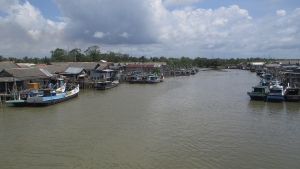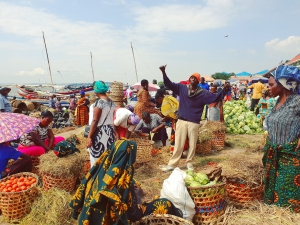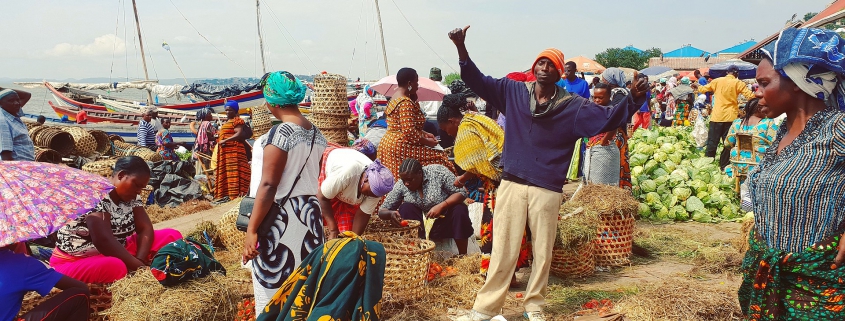Social adaptive capacity: How coastal fishers will respond to a changing environment
By Peter Aronson, SRC intern
As a pandemic has devastated the entire planet, scientists warn that the accelerating impacts of climate change in the future could be similar, or worse, as they are anticipated to lower productivity in many ecosystems (Asch et al., 2017). This will lead to severe changes to ecosystem services, with dire consequences for humanity (Vitousek, 1997). In the face of global environmental catastrophe, human societies’ futures will depend on social adaptive capacity: the adjustments to current, perceived, or anticipated social and environmental change (Janssen and Ostrom, 2006). By understanding the roles and extents of what determines social adaptive capacity in different circumstances, actions taken to reduce the impacts of environmental changes can be identified (D’agata et al., 2020). Not much research has been done in this area, so a group of scientists studied the social and ecological determinants of social adaptive capacities for fishing communities in East Africa at multiple scales.

Coastal fishing communities and other resource-dependent communities will face challenges from climate change in coming years. (Cun, 2020).
Researchers conducted surveys with members of over 650 households across 29 fishing-dependent communities in Madagascar and Kenya. They created a composite index of Adaptive Capacity (AC) which ranks households in AC according to a number of indicators. They then assessed the relationship between the index and several social-economic and environmental determinants that were predicted to affect social adaptive capacity at multiple scales (D’agata et al., 2020). They also observed the ecological conditions and management strategies in adjacent coral reef ecosystems using transects to conduct visual surveys of fish and estimate percent coral coverage. They used this data to assess fish biomass and total percent coral cover for all reefs surrounding villages to determine the overall ecological condition.

Markets and market accessibility can be very economically beneficial to fishers and strengthen their social adaptive capacity. (WikiCommons, 2020).
They found that market accessibility was the most influential factor determining fishers’ AC, with middlemen playing an important role (D’agata, 2020). This was followed by climate stress, which decreased AC by about 20%. They also surveyed households on whether they’d change their fishing activities in response to a hypothetical 50% decrease in fish catch. Overall, 95% of surveyed households would stay in fisheries by fishing at a certain level or changing fishing grounds or gear. Households with higher AC scores were more likely to change fishing gear, fish less, or stop fishing, while those with lower AC scores were more likely to keep fishing or fish more if facing halved catches (D’agata, 2020). Interestingly, ecological conditions were not consistently associated with social adaptive capacity, with an inverse relationship observed for 80% of fisher households (D’agata, 2020). This suggests the relationships within social-ecological systems may be complex and could be promotive of social-ecological traps. Scientists are worried that households with lower social adaptive capacities and better ecological conditions will be tempted to exploit resources faster, which will be beneficial in the short term but will lead to resource degradation and poverty in the long term (Cinner, 2011). Further, communities with higher social adaptive capacity, degraded environments, and low interest in exiting fisheries, can be trapped in poverty due to decreasing ecosystem services (Cinner, 2011). Those in poor social-economic conditions with low social adaptive capacity and a degraded environment may already be trapped in poverty (D’agata, 2020). In the future, similar studies should continue to monitor the complex social-ecological relationships, as global environmental changes will have strong social and ecological impacts (Birkeland, 2015; Cinner et al., 2018).
Works cited
Asch, R.G., Cheung, W.W.L., and G. Reygondeau. 2017. Future marine ecosystem drivers, biodiversity, and fisheries maximum catch potential in Pacific Island countries and territories under climate change. Mar. Policy. https://doi.org/10.1016/j.marpol.2017.08.015.
Birkeland, C. 2015. Coral reefs in the anthropocene. Coral Reefs in the Anthropocene. https://doi.org/10.1007/978-94-017-7249-5.
Cinner, J.E. 2011. Social-ecological traps in reef fisheries. Glob. Environ. Chang. Part A 21, 835–839.
Cinner, J.E., W. N. Adger, E. H. Allison, M. L. Barnes, K. Brown, P. J. Cohen, S. Gelcich, … and T. H. Morrison. 2018. Building adaptive capacity to climate change in tropical coastal communities. Nat. Clim. Chang. 8, 117–123.
Cun, C. 2020. Kurau fishing village in Central Bangka [Photograph]. WikiCommons.
D’agata, S., E. S. Darling, G. G. Gurney, T. R. McClanahan, A. N. Muthiga, A. Rabearisoa, and J. M. Maina. 2020. Multiscale determinants of social adaptive capacity in small-scale fishing communities. Environmental Science & Policy, 108, 56-66.
Janssen, M.A. and E. Ostrom. 2006. Resilience, vulnerability, and adaptation: a cross-cutting theme of the international human dimensions programme on global environmental change. Glob. Environ. Chang. Part A 16, 237–239.
Vitousek, P.M. 1997. Human domination of Earth’s ecosystems. Science 277, 494–499.
WikiCommons 2020. The fish market in Mwanza, Lake Victoria [Photograph].



